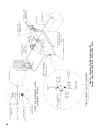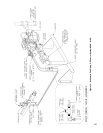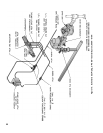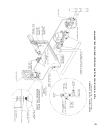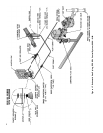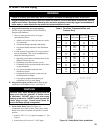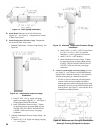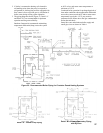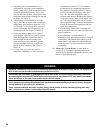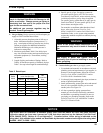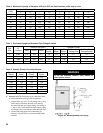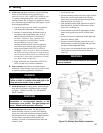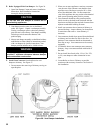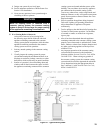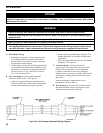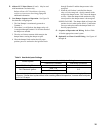
28
a. A boiler by-pass is recommended for any
installation for improved system temperature
balance, while serving to protect the boiler from
sustained condensing operation. The by-pass
also provides some measure of low return water
temperature protection by reducing ow through
the boiler. See Figure 23.
b. A blend pump is recommended to divert hot
supply water into the return when system return
temperatures can periodically dip below 135°F
or when delta T’s rise beyond 40°F because of
control schemes that shut off zone pumps for
extended periods. See Figure 23, Detail “A”.
c. Primary/secondary piping with a by-pass is
recommended to provide two points of mixing
when dual temperature systems are used (i.e.
baseboard and radiant heat, outdoor reset
and domestic hot water production, systems
incorporating night setback or multiple zone
pumps on clock schedules). See Figure 23,
Detail “B”.
d. If system three-way valves are used for
temperature modulation, or if the system will
continuously run below 135°F for extended
periods (due to low temperature applications
like snowmelt, heat pump systems or others),
primary/secondary boiler piping with a three-
way valve and return temperature sensor is
recommended. Refer to Burnham RTC Return
Temperature Control Manual and Tekmar Essay
#021 “Mixing Methods and Sizing of Variable
Speed Injection Pumps” for more information on
mixing devices and boiler protection from low
return water temperature.
4. A hot water boiler installed above radiation level
must be provided with a low water cutoff device as
part of installation.
5. A start-up strainer is recommended for all
installations (new and replacement alike) to prevent
system debris and sediment from ending up in the
boilers where it will inhibit heat transfer and may
eventually cause a cast iron section to crack from
overheating.
G. Alliance SL™ Water Heater (if used). Refer to
Alliance SL™ Installation, Operating and Service
Instructions for additional information. Install in same
manner as space heating zone.
WARNING
Burnham Commercial recommends maintaining temperature differential (drop) across the system at
40°F or less and return water temperature at minimum of 135°F.
Continued boiler operation for prolonged periods of time under conditions when temperature differential
across the system exceeds 40°F and/or return water temperature stays below 135°F, may result in premature
boiler failure due to ue gas condensation and/or thermal shock.
If the above conditions exist, to protect a boiler from sustained ue gas condensation and/or thermal
shock, the above-recommended temperatures may be maintained by employing common industry-accepted
mixing methods to provide boiler protection.
Some common methods are boiler by-pass piping, blend pumps, primary secondary piping with a by-
pass, mixing valves and/or variable speed injection pumps.



